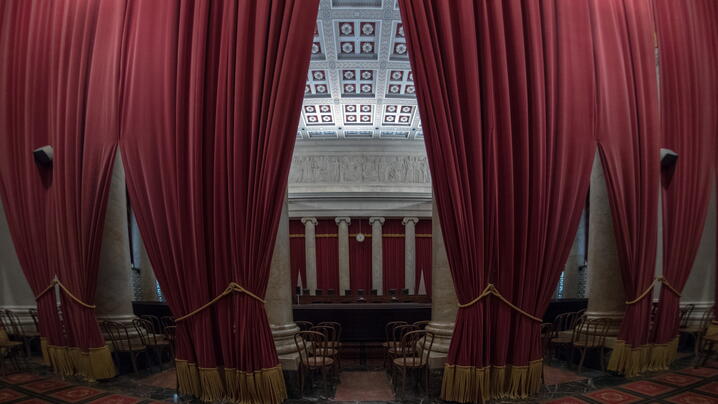
by Lisa Soronen, executive director, State and Local Legal Center
Local government election officials should be on the lookout for changes to state clothing bans at polling places following Minnesota Voter Alliance v. Mansky. That said, a closer look at the Supreme Court opinion reveals that the case may not be as bad as it seems for the 30-some states that prohibit campaign-related accessories or apparel at a polling place.
In a 7-to-2 decision, the Supreme Court struck down a Minnesota law that prohibits voters from wearing a political badge, political button, or anything bearing political insignia inside a polling place on Election Day. According to the court banning, all political speech is too broad. The State and Local Legal Center (SLLC) filed an amicus brief in this case supporting Minnesota.
Andrew Cilek was temporarily prevented from voting for wearing two items: a T-shirt with the words “Don’t Tread on Me” and the Tea Party Patriots logo along with a “Please I. D. Me” button. He argued before the Supreme Court that Minnesota’s ban on political speech at the polling place violates the First Amendment because it is overly broad.
In an opinion written by Chief Justice Roberts, the Supreme Court concluded that the statute violates the First Amendment. The court opined that states may ban some campaign-related clothing and accessories from the polling place but “must draw a reasonable line.” In short, states must be able to articulate “some sensible basis for distinguishing what may come in from what must stay out.” “[T]he unmoored use of the term ‘political’ in the Minnesota law, combined with haphazard interpretations the State has provided in official guidance and representations to this Court, cause Minnesota’s restriction to fail.”
More specifically, the statute doesn’t define “political.” Minnesota states that apparel on “any subject on which a political candidate or party has taken a stance” is disallowed. To this, the court responded: “A rule whose fair enforcement requires an election judge to maintain a mental index of the platforms and positions of every candidate and party on the ballot is not reasonable.” Likewise, the state interpreted the statute to ban apparel “promoting a group with recognizable political views.” The court pointed out this could include associations, educational institutions, businesses, and religious organizations that have stated an opinion on issues confronting voters in a given election.
The court concluded by noting that all is not lost for states that ban campaign-related apparel at polling places. Without passing on their constitutionality, the court cited to statutes from California and Texas as more “lucid” than Minnesota’s statute.
Instead of declaring Minnesota’s political apparel ban unconstitutional on its face, Justices Sotomayor and Breyer would have allowed Minnesota state courts “a reasonable opportunity to pass upon” and construe the statute. In their opinions, the dissenting justices mentioned that polling places “remain vulnerable to interpersonal conflicts and partisan efforts to influence voters,” a point discussed at length in the SLLC amicus brief. These justices cited to examples listed in the SLLC brief of disruptions at polling places that illustrate why states have adopted apparel bans.
Charles Rothfeld, Andrew Pincus, Michael Kimberly, and Paul Hughes of Mayer Brown and Eugene Fidell of the Yale Supreme Court Clinic wrote the SLLC amicus brief, which the following organizations joined: National Association of Counties, National League of Cities, United States Conference of Mayors, International City/County Management Association, and International Municipal Lawyers Association.
Related Content
SLLC Supreme Court Amicus Brief Argues It Is Okay to Ban Political Apparel at Polling Places. This 2018 blog post looked at the details of the amicus brief that the State and Local Legal Center filed on behalf of ICMA and other local government organizations in a political apparel case.
Election Day Prep Includes Keeping Voters and Poll Workers Safe. In a 2016 blog post, the ICMA blog looked at the training that local governments were giving to its election workers to keep poll workers safe on election day.
Ohio Wins Supreme Court Case Challenging Voter Rolls Removal Process. In another 2018 blog post, Lisa Soronen reviews the Supreme Court's ruling in a case involving how local and state governments remove voters from their voter rolls.
New, Reduced Membership Dues
A new, reduced dues rate is available for CAOs/ACAOs, along with additional discounts for those in smaller communities, has been implemented. Learn more and be sure to join or renew today!
